Labour wins general election, Keir Starmer is UK prime minister
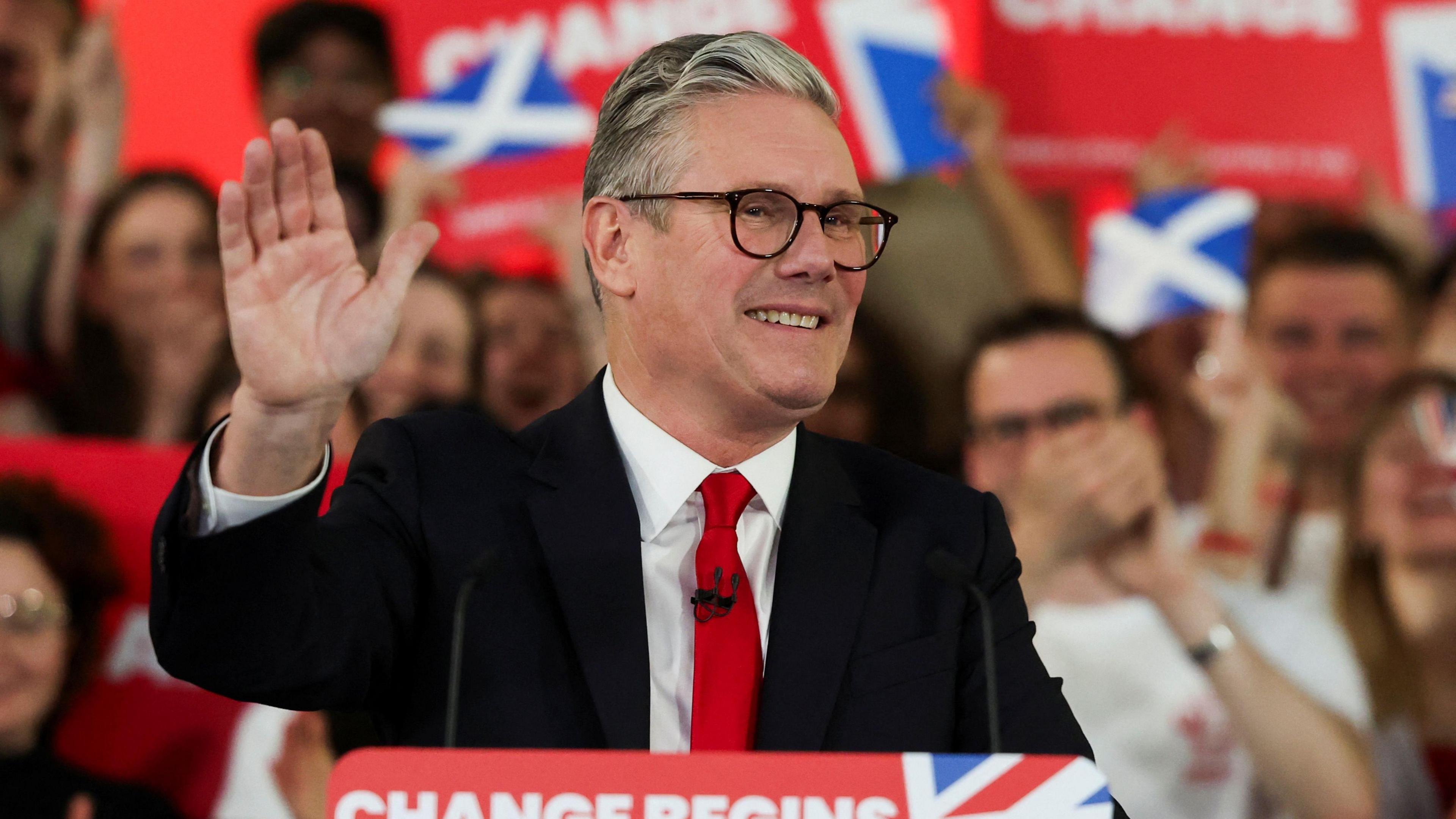
Sir Keir Starmer will soon officially be the UK's prime minister
- Published
The Labour Party have won the 2024 general election, and Sir Keir Starmer will now be the next prime minister of the United Kingdom.
Labour have won 412 seats, meaning the Conservative Party has lost power for the first time in 14 years and have suffered one of the biggest defeats in its history.
It means Keir Starmer won't need the support of any other parties to form a government.
Mr Starmer said doing so well "feels good", and added he's "ready to serve our country, ready to restore Britain to the service of working people".
Everything you need to know
Keir Starmer: Five things about the new prime minister
- Published5 July 2024
Joy, tears and Elmo - the story of the election in pictures
- Published5 July 2024
What happens when there’s a change of government?
- Published5 July 2024
What do all the election words mean?
- Published3 June 2024
Keir Starmer will be the new Prime Minister
Key points from election night
The Labour Party have won 412 seats and the Conservatives 121 with two seats still to declare
9.5 million people voted for Labour
Worst ever result in Conservative Party history
Rishi Sunak will step down as Conservative Party leader, but not yet
The Liberal Democrats have gained lots of seats, whereas the Scottish National Party (SNP) have lost most of theirs
Former prime minister Liz Truss has lost her seat of South West Norfolk
Record high number of gay, women and ethnic minority MPs expected to be elected
Sunderland was once again the first constituency to declare its result, getting it in at 23:13 on Thursday night
Larry the Cat will remain in post as Chief Mouser
Election night and morning - as it happened
General Election 2024: The story of the night
Keir Starmer found out he had held his seat of Holborn and St Pancras not long before the news of their majority was announced, and in his victory speech, he said: "The country has spoken and they're ready for change.
"The change begins right here. Because this is your democracy, your community and your future. You have voted. It is now time for us to deliver."
It was a difficult night for the Conservatives, who have lost 250 seats so far.
This makes it the worst ever defeat for the party in Parliamentary history.
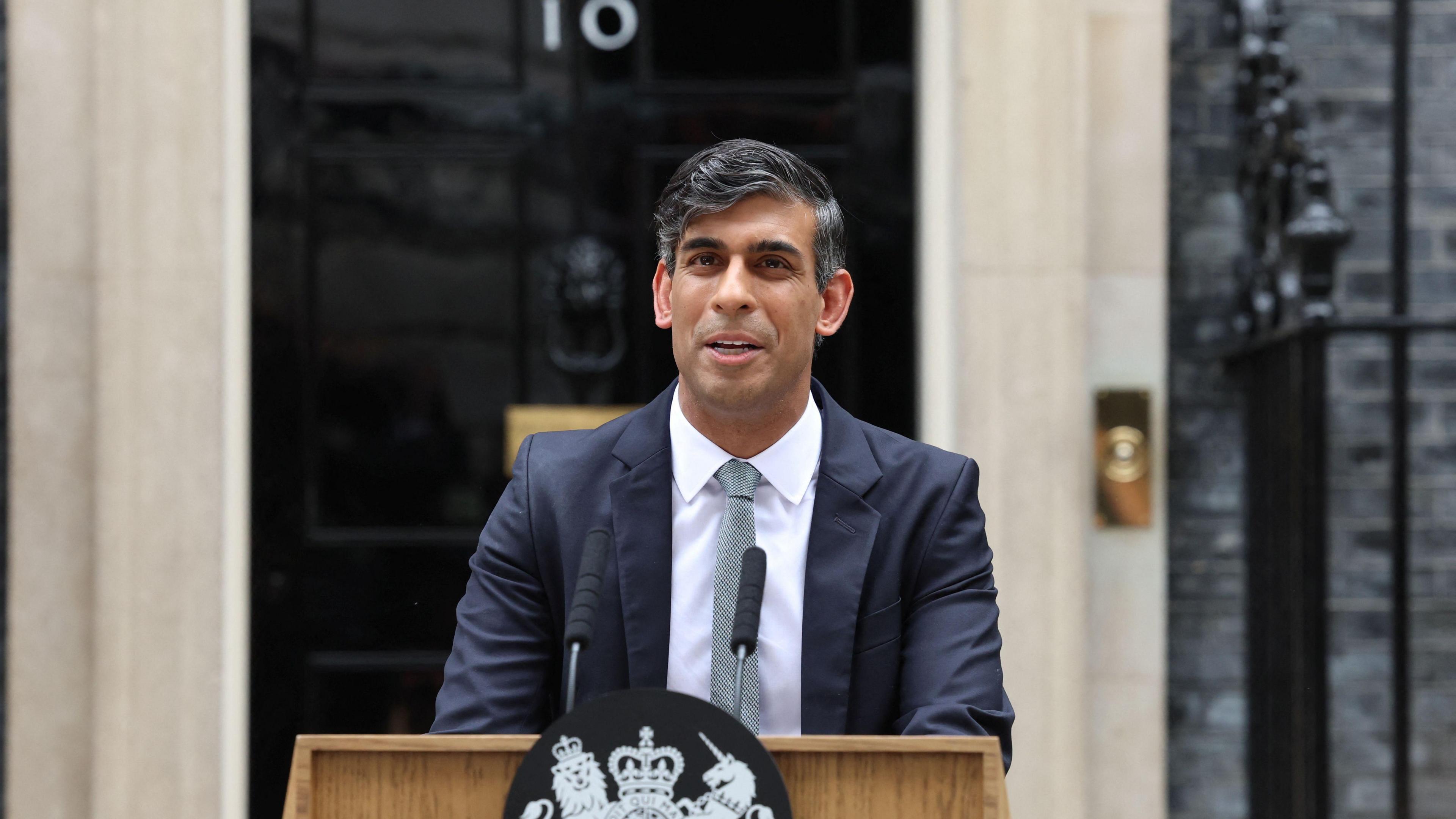
Rishi Sunak said he took "full responsibility" for his party's loss
The now outgoing prime minister Rishi Sunk has defended his seat, Richmond in Yorkshire.
Sunak said he knew Labour had won and had already called Keir Starmer to congratulate him.
He then travelled from Yorkshire to London where he made a speech from Number 10 Downing Street.
Outside Downing Street, he said "I am sorry", adding: "I have heard your anger, your disappointment, and I take responsibility".
He also announced he will step down as Conservative Party leader, although not straight away.
What does the Prime Minister do?
Many prominent Conservative figures, including a record number of those serving in Rishi Sunak's top team, have also lost their seats.
Former prime minister Liz Truss has lost her seat of South West Norfolk to Labour.
She had a majority of 26,000 majority at the 2019 election, but this reduced to 11,217 on Friday morning.
The Leader of the House of Commons, Penny Mordaunt, was one of the names expected to be in the running to replace Rishi Sunk as party leader should he step down.
She has however lost her seat of Portsmouth North to now Labour MP, Amanda Martin.
BBC Political Editor Chris Mason - analysis
Chris Mason, the top dog of the BBC's political team, has said Labour has achieved a "spectacular victory".
Their result after the last election was their worst since 1935 he explained, and they faced a mountain of a task to win even by a small margin.
But they've done it, and "Sir Keir Starmer will be prime minister by lunchtime, taking to Downing Street a colossal majority", he says.
The big picture is this: within hours, we will soon have our fourth prime minister in under two years.
The whirlwind of British politics continues.
We live in a world of unprecedented voter volatility - more people in more places are more willing to change their minds more often and more quickly about politics than ever before.
And it has happened again.
Election 2024: The story of the night in 100 seconds
However, despite their huge increase in seats, Chris Mason says Labour haven't got as many votes across the country as they were expecting.
And he says Labour still have a huge challenge on their hands.
"Remember that Prime Minister Starmer, Chancellor Rachel Reeves - as they soon will be - and the new government will confront all of the old problems that caused its predecessor so much trouble: the cost of living, the government’s finances, the tax burden, a dangerous world - and no majority, however big, can erase them."
Learn more about our voting system with BBC Bitesize
What is First Past the Post?
- Attribution
More from election night
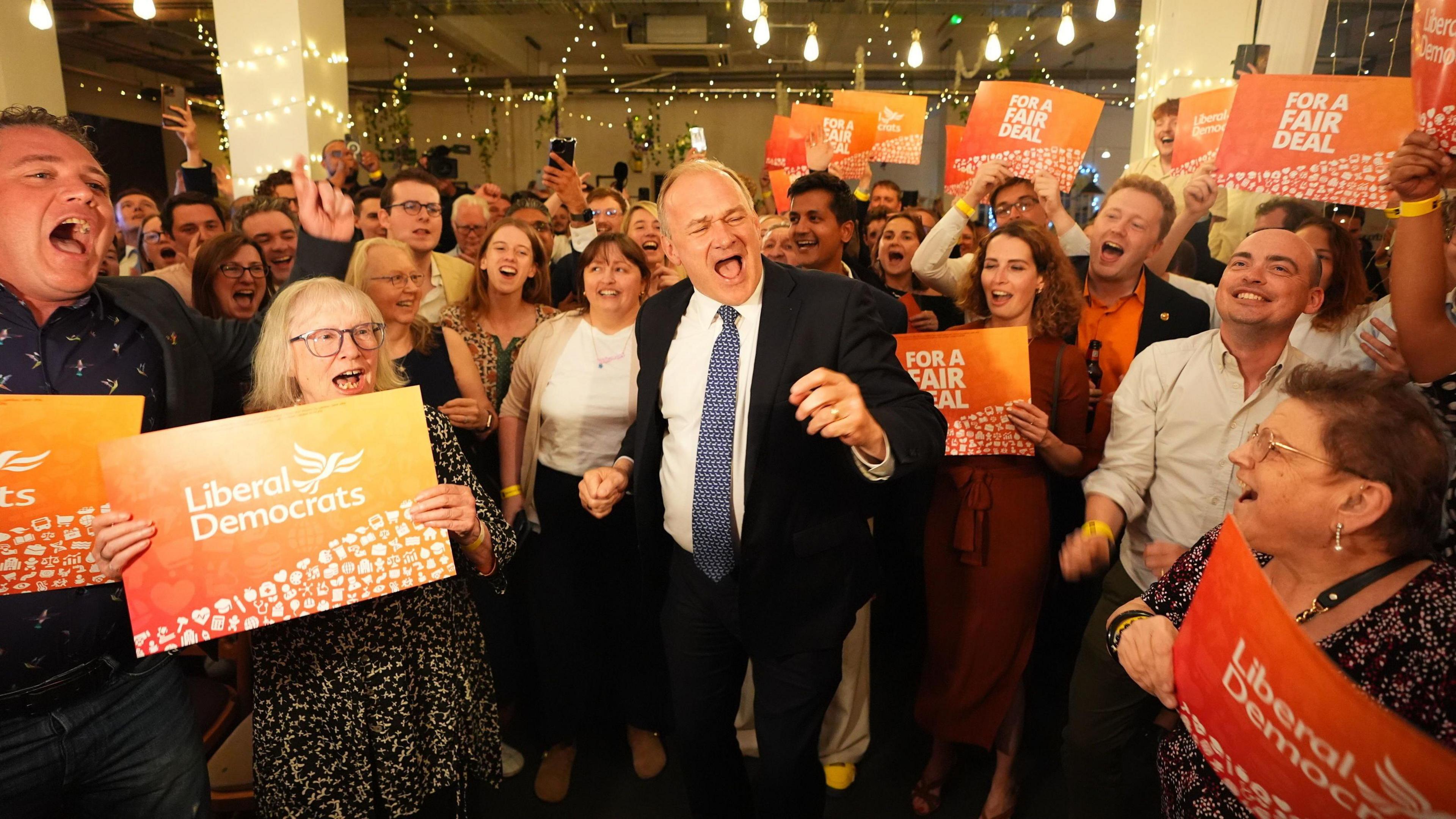
Sir Ed Davey and the Liberal Democrats have been celebrating already
The Liberal Democrats have on the other hand had a very good night so far.
Leader Sir Ed Davey said he'd hoped for the "best result for a century", and have achieved that by winning 71 seats.
This means they are once again be the third largest party in the House of Commons.
This was until recently the Scottish National Party (SNP).
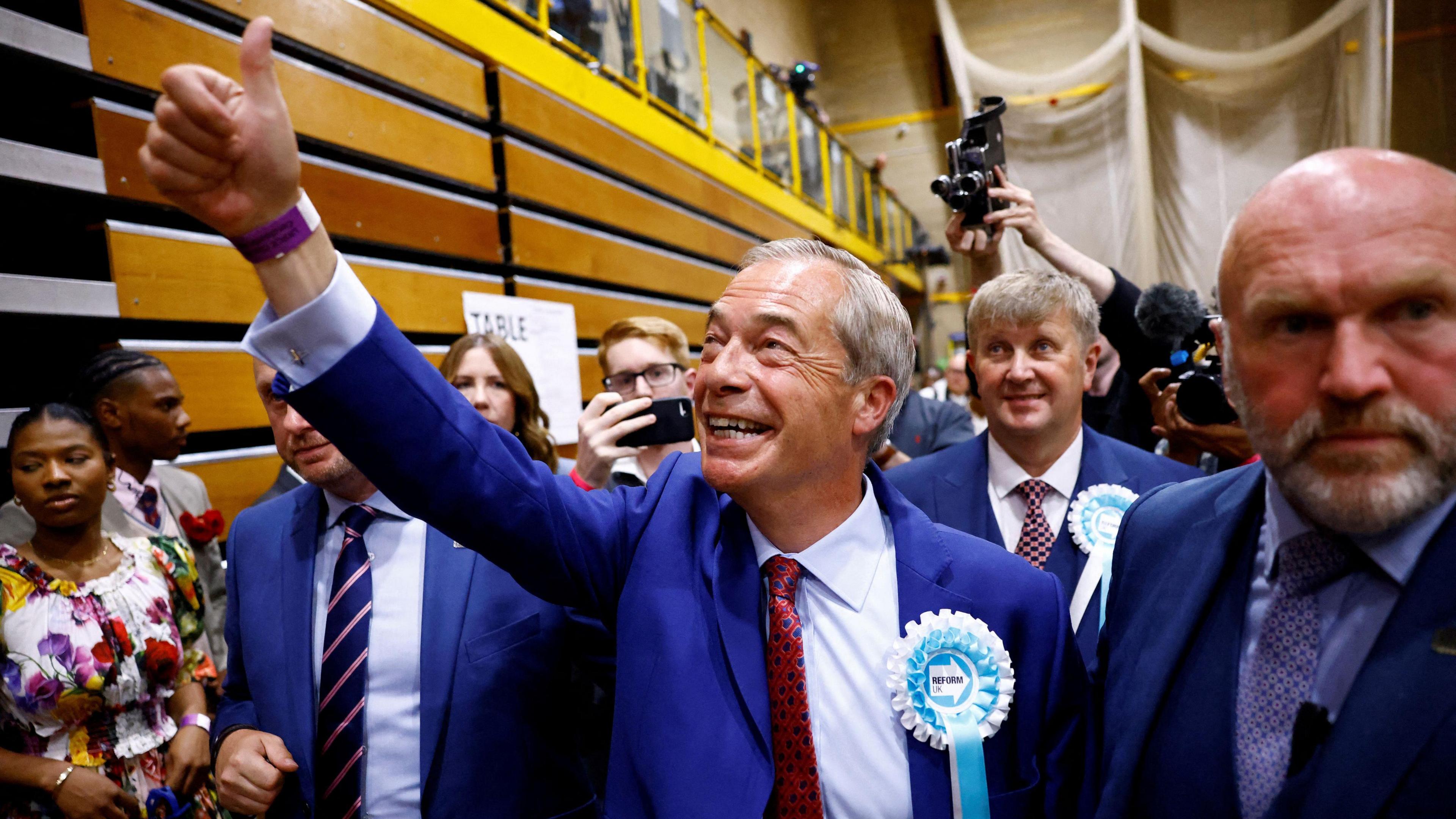
Nigel Farage has tried to become an MP before but this will be his first time sitting in the House of Commons
Nigel Farage, leader of the Reform party, has won in Clacton. He has run to be an MP before, but this is the first time he has been successful.
He was a prominent figure during the Brexit campaign, and was previously leader of the UK Independence Party (UKIP).
His party won five seats.
The Green Party have increased their seats from one to four, the most seats the party has ever had.
It includes Brighton, their only seat for a number of years, held by former leader Sian Berry.
Watch our Democracy special and learn how an election works
Elsewhere in the UK, the SNP, which until now had 43 seats, now have nine.
The SNP leader John Swinney has said it's been a "very, very difficult and damaging" night for his party.
Scottish Labour have already made gains, and its leader, Anas Sadat, has said he's "confident we will have a majority" in Scotland, which would be their first since ex-SNP leader Nicola Sturgeon came to power in 2015.
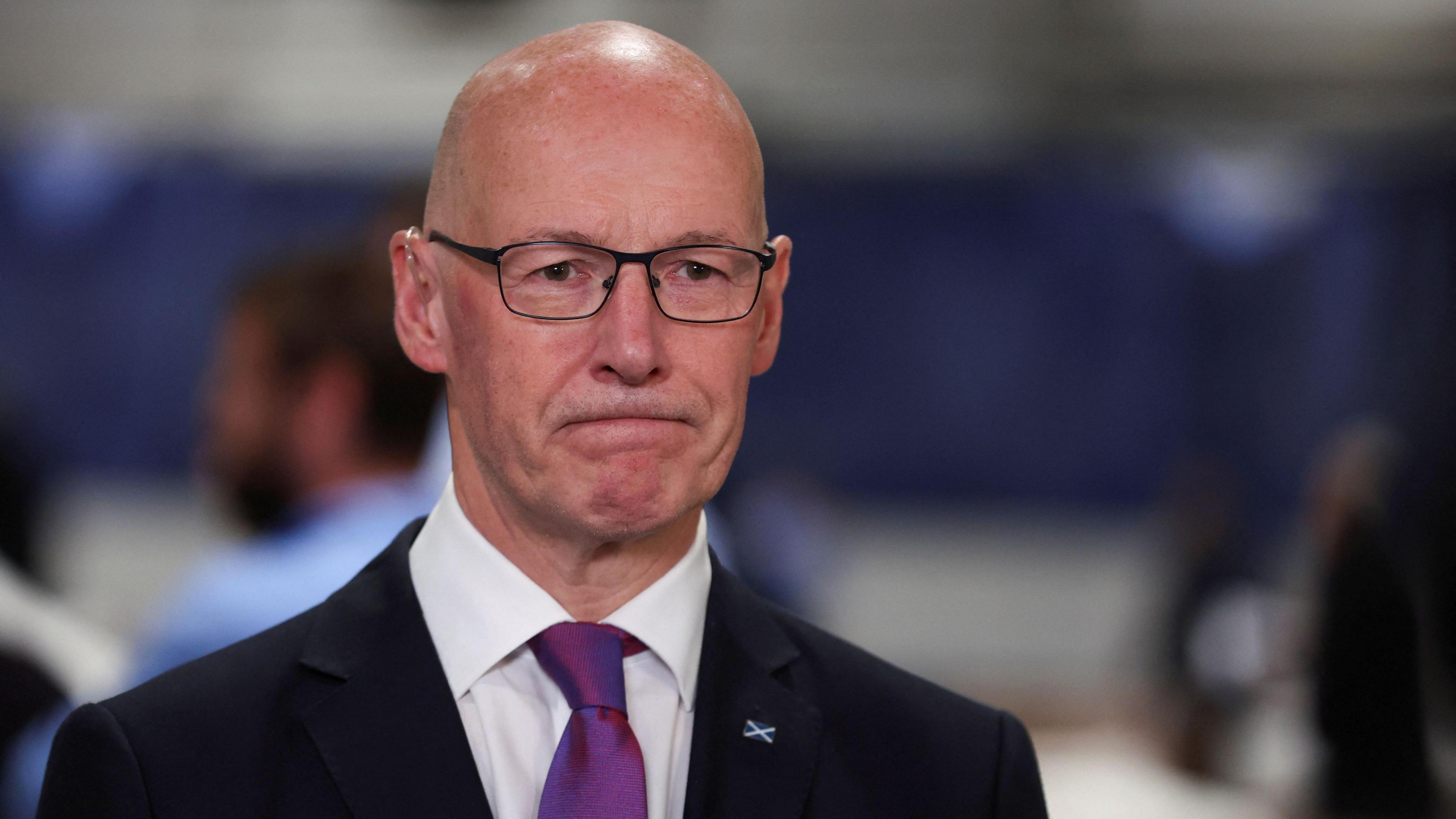
John Swinney, leader of the SNP, has said the night has been very difficult for him and his party
In Wales, Labour have made significant gains, winning many seats back from the Tories, who have lost all their seats there.
Three previous Welsh secretaries (the person in the cabinet responsible for issues to do with Wales) failed to keep their seats: Alun Cairns, Stephen Crabb and Simon Hart.
The current Welsh Secretary, David TC Davies, has also lost his seat, making him the first sitting Welsh Secretary to do so.
The Liberal Democrats have won Brecon, meaning they have an MP in Wales for the first time since 2019.
Plaid Cymru, a party that only has representatives in Wales, are predicted to win four seats in total.
In Northern Ireland, the Democratic Unionist Party (DUP) have lost three of its eight seats, meaning Sinn Féin is now the Northern Irish party with the most MPs.
